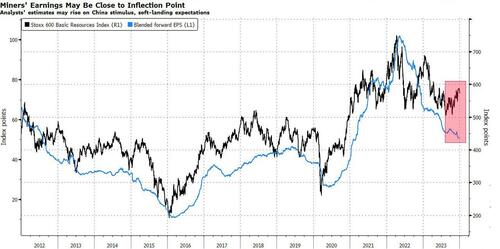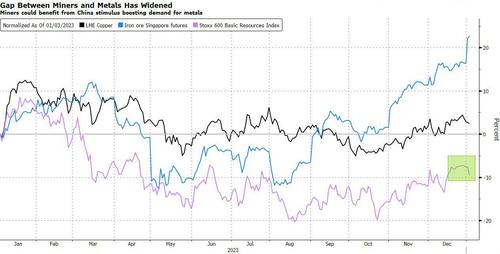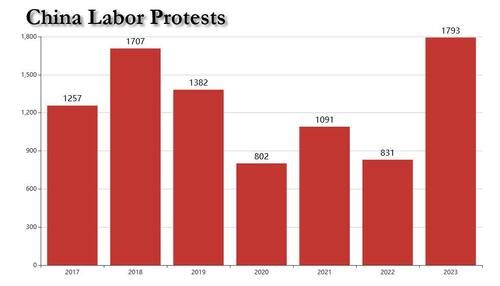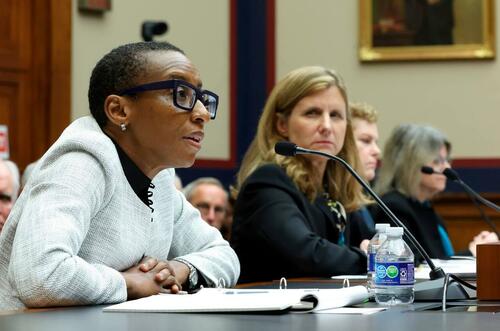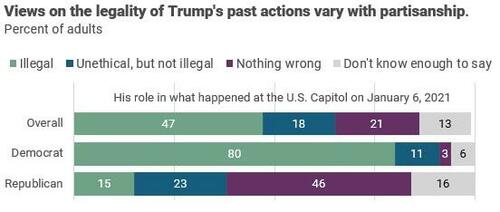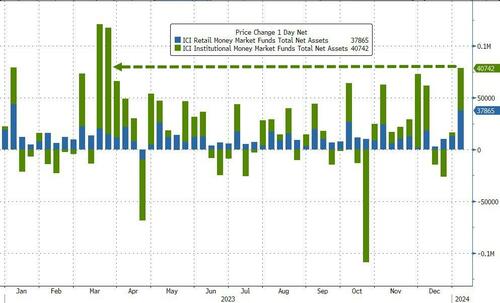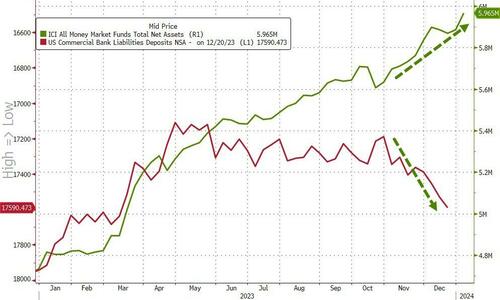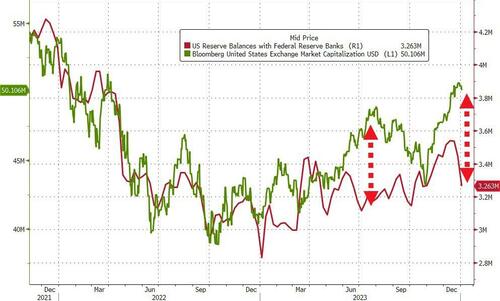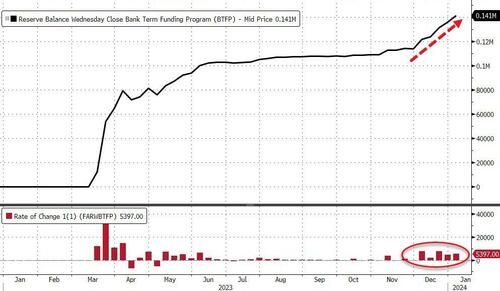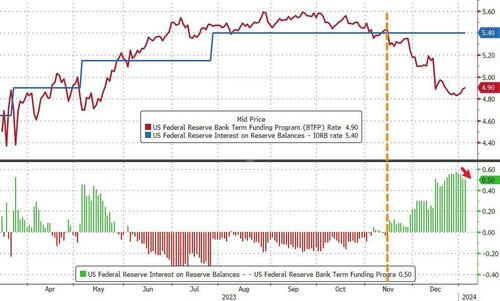Authored by Katabella Roberts via The Epoch Times,
The Department of Justice (DOJ) has filed a lawsuit against Texas over a new state law aimed at increasing security at the southern border by granting police broader powers to arrest, prosecute, and deport immigrants who illegally cross the U.S.-Mexico border.

The DOJ filed the lawsuit against Senate Bill 4 (SB 4) in an Austin federal court on Jan. 3 on behalf of the United States federal government, including the Department of Homeland Security, and the Department of State.
It lists Gov. Greg Abbott and Texas Department of Public Safety Director Steve McCraw as defendants.
Plaintiffs argue SB 4 is preempted by federal law and thus violates the Supremacy Clause of the United States Constitution and the Foreign Commerce Clause.
The legislation at the center of the lawsuit was introduced by Republican state Sen. Charles Perry and sponsored in the House by Republican state Rep. David Spiller in November.
It was passed by the Republican-controlled Texas legislature that same month and signed into law by Mr. Abbott in December.
The measure makes it a state misdemeanor to illegally cross or attempt to cross into Texas from Mexico at any location other than a lawful port of entry.
It also allows state and local law enforcement officials to arrest suspected illegal immigrants, take their fingerprints, and conduct a background check.
According to the legislation, judges would be granted the option to order some illegal immigrants to return to the country from which they illegally entered the United States, in lieu of prosecution, but only after all identifying information is obtained and cross-referenced with local, state, and federal criminal databases.
However, the misdemeanor charge would be raised to a felony charge if the illegal immigrant has previously been convicted of two or more misdemeanors involving drugs, crimes against a person, or both or if the individual refuses to comply with the judge’s order to return to leave the United States.
‘Clearly Unconstitutional’
The maximum penalty for a misdemeanor charge is one year in prison while for a felony, the penalty is two to 20 years in prison.
Republicans have argued that the measure, which is scheduled to take effect on March 5, is needed amid what they say is mishandling by the Biden administration of the ongoing immigration crisis. U.S. Customs and Border Protection data shows that agents encountered a record-setting 2.48 million illegal immigrants at the southern border in fiscal year 2023.
U.S. Immigration and Customs Enforcement (ICE) estimated in its December 2023 report that the number of non-detained illegal immigrants inside the United States has now exceeded 6 million.

A Texas National Guard soldier directs migrants during a dust storm at a makeshift camp located between the Rio Grande and the U.S.–Mexico border fence in El Paso, Texas, on May 10, 2023. (John Moore/Getty Images)
In their lawsuit, the DOJ urges the court to declare SB 4 unconstitutional and prevent Texas from implementing it, arguing that immigration laws can only be enforced by the federal government, not states.
“SB 4 is clearly unconstitutional,” said Associate Attorney General Vanita Gupta in a statement announcing the lawsuit.
“Under the Supremacy Clause of the Constitution and long-standing Supreme Court precedent, states cannot adopt immigration laws that interfere with the framework enacted by Congress. The Justice Department will continue to fulfill its responsibility to uphold the Constitution and enforce federal law.”
The DOJ noted that the Supreme Court, in Arizona v. United States, previously confirmed that decisions relating to the removal of noncitizens from the United States touch “on foreign relations and must be made with one voice.”
The Department argued that SB 4 impedes the federal government’s ability to enforce entry and removal provisions of federal law and interferes with its conduct of foreign relations.

Associate Attorney General Vanita Gupta speaks at a press conference at the Department of Justice in Washington on Dec. 6, 2021. (Anna Moneymaker/Getty Images)
‘Prepared to Fight Lawsuit’
SB 4 includes some exceptions, including that law enforcement officials may not arrest immigrants who entered the United States illegally if the individual is on the premises or grounds of a public or private primary or secondary school for educational purposes; in a church, synagogue, or other established place of religious worship; or in a health care facility.
It also states that suspects can provide evidence that they are in the country legally during the prosecution.
The DOJ’s lawsuit comes after Civil Rights groups including the American Civil Liberties Union (ACLU), the ACLU of Texas, and the Texas Civil Rights Project filed a lawsuit against SB4 in December, claiming it is preempted by federal law and infringes upon the federal government’s authority under the U.S. Constitution to enforce immigration laws.
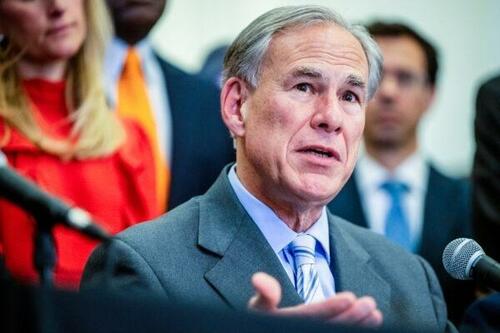
Texas Gov. Greg Abbott speaks during a news conference in Austin, Texas, on March 15, 2023. (Brandon Bell/Getty Images)
Mr. Abbott responded to the DOJ’s lawsuit on X on Wednesday evening. “Biden sued me today because I signed a law making it illegal for an illegal immigrant to enter or attempt to enter Texas directly from a foreign nation. I like my chances. Texas is the only government in America trying to stop illegal immigration,” he wrote.
“The Speaker of the U.S. House of Representatives says that I and the state of Texas have the ‘constitutional authority’ to secure [the] border. Remember, it is Congress, not the President, that has the Constitutional power to regulate immigration,” he added.
He said in previous comments that SB 4 was needed to “help stop the tidal wave of illegal entry into Texas” and that President Biden’s “deliberate inaction has left Texas to fend for itself.”

Texas builds its own border wall in its effort to secure the border. (Courtesy Office of Greg Abbott)
In recent years, Texas has spent more than $4 billion a year on efforts to curb illegal immigration at the border, including deploying $11 million in rolls of concertina wire to reinforce portions of the Texas-Mexico border and constructing steel border structures. The Abbott administration has also bused tens of thousands of migrants to sanctuary cities across the country, including Washington, D.C., New York City, Chicago, and Los Angeles. In prior years, Texas spent about $400 million on border security and immigration, Texas Lt. Gov. Dan Patrick previously said.
In a post on X on Wednesday evening, Texas Attorney General Ken Paxton said the measure was created to “address the endless stream of illegal immigration facilitated by the Biden administration.”
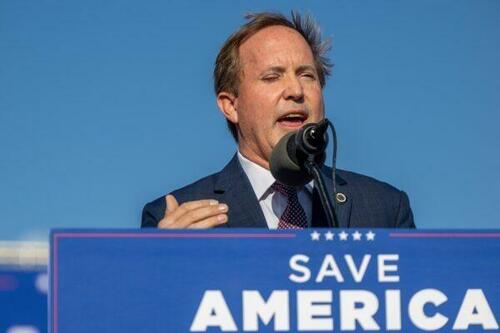
Texas Attorney General Ken Paxton speaks at the “Save America” rally in Robstown, Texas, on Oct. 22, 2022. (Brandon Bell/Getty Images)
“Millions of unvetted foreign aliens have been released into Texas due to President Biden’s policies of dismantling border security at the US-Mexico border, collaborating with cartels, and inviting violent criminals and drug traffickers to enter the country,” Mr. Paxton said.
“Just as I am prepared to fight the lawsuit brought by the extremist ACLU and the nonprofits enriching themselves due to the federal government’s open borders doctrine, I am prepared to fight the Biden Administration whose immigration disaster is leading our country to ruin,” he continued.
“Texas has the sovereign right to protect our state.”


